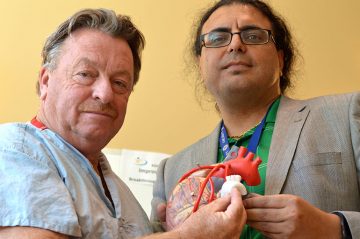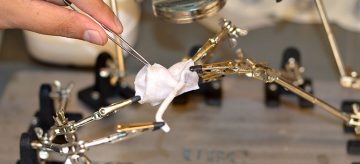A UBC invention has made it possible for doctors to vastly improve their bypass surgery techniques without relying on animals.
The invention — synthetic heart valves, arteries and veins made of polyvinyl alcohol hydrogel, that resembles human tissue — was developed by researchers at UBC’s Okanagan campus.
The polyvinyl “tissue” makes it possible for surgeons and medical residents to practise bypass surgery techniques using the synthetic material as opposed to the current method of using arteries and veins from dead pigs or human cadavers.
“One of the major issues with using arteries from human or animal cadavers is that they break down very quickly if they are not treated with preservatives,” says inventor and assistant professor Hadi Mohammadi. “This synthetic material doesn’t decompose and can’t be contaminated, meaning doctors can practise their technique almost anywhere.

Inventors and UBC researchers Guy Fradet (left) and Hadi Mohammadi hold up their synthetic heart tissue.
“An added benefit is that this material can be created safely and cheaply, which could solve any issues surgeons currently have in accessing practise materials.”
The invention, currently only used for teaching purposes, is already being used by a number of surgeons and medical residents at the Kelowna General Hospital (KGH) in B.C.’s interior.
The new synthetic material feels like living human tissue and provides a number of benefits over what is currently used, says co-inventor Guy Fradet, head of cardiovascular surgery at KGH and an associate professor in UBC’s Faculty of Medicine.
“A problem with using arteries from animals or human cadavers for practising bypass surgery is that they feel different than living human tissue,” says Fradet. “The more realistic we can make surgical practise, the easier it will be to prepare surgeons for the operating room, which can only benefit patients.”

Synthetic heart artery invented at UBC’s Okanagan campus.
The synthetic heart valves, veins and arteries are currently being used to practise bypass surgery on actual hearts harvested from pigs.
The two inventors are now working towards creating a synthetic heart with the new material, which could then be used to largely eliminate the need for any animal or human cadaver tissues and organs when practising heart surgery.
Mohammadi and Fradet’s research was recently published in the journal Cardiovascular Engineering and Technology.